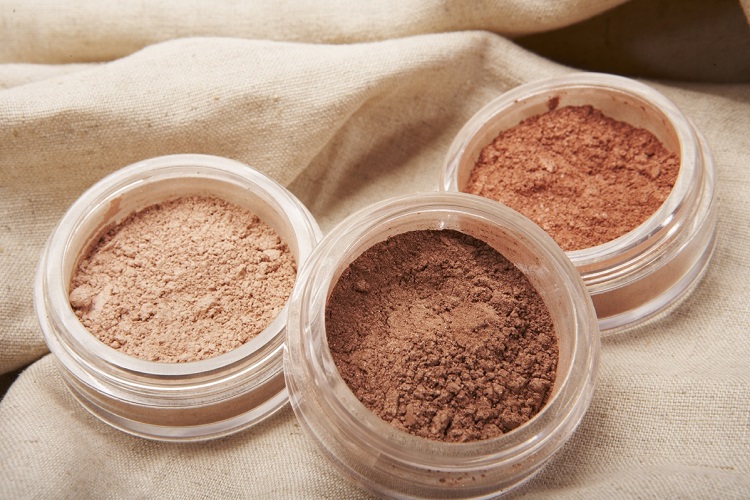Mineral makeups have recently been marketed as a new, healthier makeup choice. Mineral makeup does have many benefits, ranging from comfort, versatility, and stay power. However, it does come with its negative qualities, such as accentuating fine lines and wrinkles or accentuating oily skin. While it is not for everyone, read further to learn more about this popular makeup.

General Info on Mineral Makeup
When discussing mineral style makeup, it is easier to describe what is not in it than what is. As a general rule, mineral makeups do not contain oils, parabens, fragrances, talc, preservatives or chemicals. This makes mineral makeup ideal for those with sensitive skin. It is also a great choice for those who do not like to replace their makeup often, as it has a much longer shelf life than its liquid counterparts. Not only does the makeup last a long time in its container, but on your face as well. The pigments are long-lasting for an all day makeup coverage.
Who Should Use Mineral Makeup
Anyone who has experienced allergies to makeup in the past should give mineral makeup a try. This makeup is non-comedogenic, which means it does not clog pores and allows the skin to breathe. Because of this, it won’t make existing skin conditions worse, like dry skin or rosacea. It is exceedingly rare to hear of someone who has an allergic reaction to a mineral makeup. It is also a great makeup choice for acne-prone skin. Without the presence of oils, mineral makeups are not going to worsen existing acne or cause new breakouts.
How Mineral Makeup Works
Mineral makeup works by binding to oils that are naturally present on your face. Because it binds to the oils on the surface of the skin, it does not seep further into the skin, potentially clogging pores and exasperating existing skin conditions such as acne. When it binds to the oils, it becomes much more resilient and will stay on your face even if it comes into contact with water. Loose, and powdery, it is hard to get the “lines” that are caused by some liquid foundations. The powder formulation allows the product to be evenly blended into the skin without looking cakey or obvious.
How To Use Mineral Makeup

As always when applying any form of makeup foundation, start with a clean, moisturized face. Mineral makeup is best applied with a brush, such as a flat powder foundation brush or a kabuki brush.
For best results:
– Tap a small amount of the powder into the lid of its container.
– Swirl your brush until it picks up the powder, and then tap your brush on the side of the lid to shake off excess powder.
– Begin with your t-zone, moving in downward motions. Start in the middle and work your way out for the most natural look.
It is important with mineral foundations to work downward, as otherwise the fine powders will adhere to any hairs on your face and accentuate them. Most mineral foundations are build-able, so if you are not satisfied with the amount of coverage from your first application, go ahead and do another layer. Unless your skin is very dry, mineral foundations will not accentuate fine lines or wrinkles.
Mineral Makeup Contraindications
There are several things you should keep in mind when you are trying to avoid contraindications when using mineral makeup. A few of these are:
– Check ingredient lists. The benefit of a mineral makeup is that the list is small, but still check to ensure none of your allergy triggers are on the list.
– Use high-quality makeup from a trusted brand. It’s not necessary to break the bank, but remember that cheap makeup isn’t good, and good makeup isn’t cheap.
– Check for the presence of bismuth oxychloride. While it doesn’t show up often in mineral makeups, it is known to irritate the skin of some users.
– Keep your makeup brushes clean! Invest in a good brush cleaner, and use it often. While bacteria will not grow in your mineral makeup, it can grow on your brushes.
Mineral Makeup Pros and Cons
Pros
– Very skin friendly, it seems to be a makeup that even those with very sensitive or allergy prone skin can wear.
– Several of the minerals in the makeup are natural UV blockers (titanium dioxide and zinc oxide) making it an effective sunscreen as well as makeup.
– It does not harbor bacteria, making its shelf life much longer than that of other makeup varieties.
– Build-able, so you can wear it sheer for an everyday look, or add more for going out.
– Mineral makeups are long lasting on the skin. You will rarely if ever have to “touch up” your mineral makeup after a long day.
– Provides natural UV protection.
– Provides even, natural looking coverage.
Cons
– If you have excessively dry skin, mineral makeup may stick to the dry patches and make them look even worse.
– When skin is very oily, this may also be accentuated due to the mica in some varieties.
– May contain mineral bismuth oxychloride, which is a known skin irritant.
While there are negatives to this makeup type, the positives far outweigh them. Mineral makeups provide an excellent opportunity for those who may have had an issue with makeups in the past to again enjoy the ability to use a quality product. Not just any makeup, but one that actually benefits the skin through its non-comedogenic qualities and effective UV protection.
While poorly made makeups do exist, the market is full of trusted brands with proven track records. It should not be hard to find a mineral style makeup that will fit your needs. What is your experience with Mineral Makeup? What do you love or dislike about it? Share your thoughts, we would love to hear from you!
